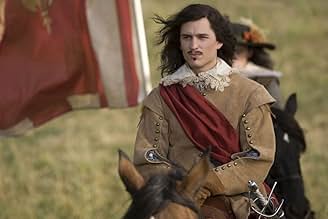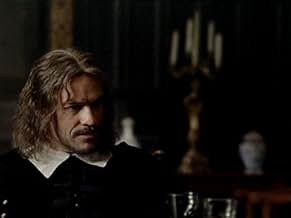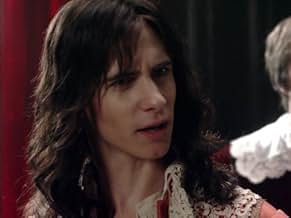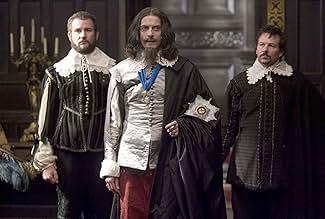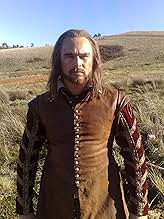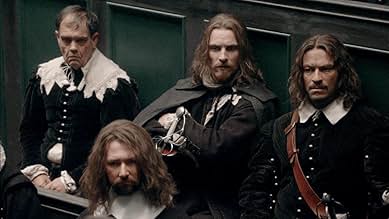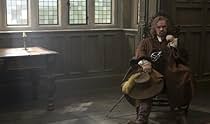The Devil's Whore
- Miniserie de TV
- 2008
- 47min
CALIFICACIÓN DE IMDb
7.0/10
2.8 k
TU CALIFICACIÓN
Sigue el desarrollo de la Guerra Civil inglesa a través de la historia de una joven, la ficticia Angelica Fanshawe, y sus tres maridos.Sigue el desarrollo de la Guerra Civil inglesa a través de la historia de una joven, la ficticia Angelica Fanshawe, y sus tres maridos.Sigue el desarrollo de la Guerra Civil inglesa a través de la historia de una joven, la ficticia Angelica Fanshawe, y sus tres maridos.
- Ganó 1 premio BAFTA
- 8 premios ganados y 7 nominaciones en total
Explorar episodios
Opiniones destacadas
I can't believe that I know so little about the English Civil War and this series has stimulated me to learn more. The characters were portrayed so well that I feel I want to know so much more about those who were real people. John Simm's performance as Edward Sexby haunts me because he spent so much time longing for a relationship with Angelica, then finally reached his goal, only to move away from her again towards another greater goal. It was inspiring, and I was captivated by the visual impact and the political power of the plot. Like the West Wing, the Devil's Whore managed to make me interested in political issues that may seem dull elsewhere. Oliver Cromwell came across as a real man and most of the real historical figures were 3-dimensional. Angelica was fascinating and powerful, and it doesn't matter that she was not real historically - she held the story together. The details of the struggle between the monarch and the parliamentarians is very gripping and is at the roots of our present system of democracy - probably the model for all democracies.
As a Quaker, I need to know as much as possible about this period in English history, because out of the many religious and political groups which grew up in the turbulence of the 17th century, the Society of Friends is one that has survived adapted to modern life - something that the Ranters and Levellers were unable to do.
Overall, my main impression was one of fascination with the story of Angelica's life and Sexby's devotion to her - it was a great inspiring tale. Such a shame that it had to be cut down from 12 episodes to 4 - how much more would we have gained if we could have seen all that was planned?
As a Quaker, I need to know as much as possible about this period in English history, because out of the many religious and political groups which grew up in the turbulence of the 17th century, the Society of Friends is one that has survived adapted to modern life - something that the Ranters and Levellers were unable to do.
Overall, my main impression was one of fascination with the story of Angelica's life and Sexby's devotion to her - it was a great inspiring tale. Such a shame that it had to be cut down from 12 episodes to 4 - how much more would we have gained if we could have seen all that was planned?
Well, I had high hopes for this mini series from across the Atlantic, and some of those expectations were met, but, as I should have expected, others were dashed.
The production values are of high caliber. Costumes, sets and locations, particularly for a British mini series, are all exceptional. There's very little in the way of criticism when it comes to poking at the amount of money and care that went into the recreation of late renaissance Britain. Truly, a first rate production where all imagery is concerned.
So where does this small collection of films fall flat? This is going to sound sexist, but it truly isn't, it's a comment aimed at the continued market trend for television; the series was aimed specifically at a female audience with only the superficiality of placating to masculine interests. Every male in this series of films is portrayed as boorish on some level. From Royalists to Parliamentarians, and shades of gray in-between, few of these men have a spine.
Additionally, they're all sex starved. They either are biding their time for sexual favors, or are so wanton as to be willing to force themselves on he fairer sex. They seem to have little else on their minds. And when they are granted female accompaniment, they then squander their "victory" in some sort of stupidity.
That's not really a comment on what I think of society as I think of what TV producers think their audiences want to see. Again, as I've written in other reviews, the TV producer thinking is that since women buy things for the home, it is therefore that audience that the shows must cater to.
"The Devil's Whore" is no different. The concepts and ideals for which both sides of the English Civil War fought are hardly ever mentioned. It seems to be the assumption that said notions have no place within the female psyche, and therefore are not worth exposition. Female concerns are for family, friends and young ones.
So what does one do? The man who watches this can do little but shake his head, and maybe say "Huh, the 60's film with Richard Harris was a bit more entertaining..." Which, in my view, it was.
But the film with Harris had the benefit of being a high budget major theatrical film. It wasn't some one off made for TV mini series that had to compete with "Dancing with the Stars" or other sub-IQ fodder that masks for entertainment.
You may say, "Mister Blueghost, what were you expecting?" Look, I knew this was going to be a TV miniseries about a woman during the English Civil War, but I expected the Powers-that-Be in the UK to do their usual bucking of American market research, and make a film for both sexes and most ages. Something intelligent. Something with a little more purposeful action than the banal placation presented in this film's battle-sequences.
In short, it was a pleasure to see something not made by and for American house-wives and professional women, but it was equally disappointing to see something made for British house-wives and professional women.
*sigh*
Well, maybe I'll whip out my copy of Cromwell tonight, and grin as I see Richard Harris give a high energy performance in his Irish-thesping style of portraying a historic figure who didn't like the Irish a great deal.
Well, I think I've learned my lesson about splurging on a UK TV series of which I know nothing.
Watch at your risk.
The production values are of high caliber. Costumes, sets and locations, particularly for a British mini series, are all exceptional. There's very little in the way of criticism when it comes to poking at the amount of money and care that went into the recreation of late renaissance Britain. Truly, a first rate production where all imagery is concerned.
So where does this small collection of films fall flat? This is going to sound sexist, but it truly isn't, it's a comment aimed at the continued market trend for television; the series was aimed specifically at a female audience with only the superficiality of placating to masculine interests. Every male in this series of films is portrayed as boorish on some level. From Royalists to Parliamentarians, and shades of gray in-between, few of these men have a spine.
Additionally, they're all sex starved. They either are biding their time for sexual favors, or are so wanton as to be willing to force themselves on he fairer sex. They seem to have little else on their minds. And when they are granted female accompaniment, they then squander their "victory" in some sort of stupidity.
That's not really a comment on what I think of society as I think of what TV producers think their audiences want to see. Again, as I've written in other reviews, the TV producer thinking is that since women buy things for the home, it is therefore that audience that the shows must cater to.
"The Devil's Whore" is no different. The concepts and ideals for which both sides of the English Civil War fought are hardly ever mentioned. It seems to be the assumption that said notions have no place within the female psyche, and therefore are not worth exposition. Female concerns are for family, friends and young ones.
So what does one do? The man who watches this can do little but shake his head, and maybe say "Huh, the 60's film with Richard Harris was a bit more entertaining..." Which, in my view, it was.
But the film with Harris had the benefit of being a high budget major theatrical film. It wasn't some one off made for TV mini series that had to compete with "Dancing with the Stars" or other sub-IQ fodder that masks for entertainment.
You may say, "Mister Blueghost, what were you expecting?" Look, I knew this was going to be a TV miniseries about a woman during the English Civil War, but I expected the Powers-that-Be in the UK to do their usual bucking of American market research, and make a film for both sexes and most ages. Something intelligent. Something with a little more purposeful action than the banal placation presented in this film's battle-sequences.
In short, it was a pleasure to see something not made by and for American house-wives and professional women, but it was equally disappointing to see something made for British house-wives and professional women.
*sigh*
Well, maybe I'll whip out my copy of Cromwell tonight, and grin as I see Richard Harris give a high energy performance in his Irish-thesping style of portraying a historic figure who didn't like the Irish a great deal.
Well, I think I've learned my lesson about splurging on a UK TV series of which I know nothing.
Watch at your risk.
An amazingly compact narrative packs a remarkable amount of emotion and philosophical musing into a sweeping narrative; this is television that delivers all the satisfactions of the old-fashioned novel.
With a title like "The Devil's Whore" we are prepared for a rip-roaring bodice-ripper...and while bodices are indeed ripped...nay, shredded!...there is oh so much more going on here. Love long-denied over decades of tumultuous civil war, labyrinthine tests of loyalty, vengeance played out over decades, and various other devices create a nonstop narrative drive; try coming to the end of one episode without wanting to watch the next one at once. But at the very heart of this story is an inquiry into the deepest questions of existence: who are we amid our fellow humans, what force or forces rule the universe, and what does freedom really mean? A restless intelligence moves through this story, suffusing it with heartbreaking insight.
Kudos to the whole cast, to a counter-intuitive musical track, and to the splendid visual sense that informs the whole production.
The only thing that stops me from giving 10 stars is a certain dissatisfaction with the ending. Granted, the filmmakers face an almost impossible task to create a moment of transcendence to match all that has come before. Maybe on a second viewing I will change my mind about that.
With a title like "The Devil's Whore" we are prepared for a rip-roaring bodice-ripper...and while bodices are indeed ripped...nay, shredded!...there is oh so much more going on here. Love long-denied over decades of tumultuous civil war, labyrinthine tests of loyalty, vengeance played out over decades, and various other devices create a nonstop narrative drive; try coming to the end of one episode without wanting to watch the next one at once. But at the very heart of this story is an inquiry into the deepest questions of existence: who are we amid our fellow humans, what force or forces rule the universe, and what does freedom really mean? A restless intelligence moves through this story, suffusing it with heartbreaking insight.
Kudos to the whole cast, to a counter-intuitive musical track, and to the splendid visual sense that informs the whole production.
The only thing that stops me from giving 10 stars is a certain dissatisfaction with the ending. Granted, the filmmakers face an almost impossible task to create a moment of transcendence to match all that has come before. Maybe on a second viewing I will change my mind about that.
The English Civil War has often been over looked as a subject for drama, with most films being very inaccurate. The Civil War was a important watershed moment in English history, showing a king can be overthrown, strengthen Parliament, reformed the English army and in the end limits power the power of kings and a tyrant. The Devil's Whore is also a new step for Channel Four, because they don't normally make costume dramas (BBC normally makes them). Channel Four focus has often been documentaries, buying good American programmes, and make comedy series like Peep Show and the Inbetweeners.
The Devil's Whore has a similar approach to Rome, focusing on a fictional character who becomes involved in historical events and meets famous historical people.
The focus of the programme is on Angelica Fanshawe (Andrea Riseborough), an aristocratic woman from a Catholic background. She has rejected God and sees the Devil because her mother ran off to become a nun. The show starts off with Angelica being a member of the Queen's household just before the English Civil War. But as the Civil War starts and Angelica is forced out King Charles I's camp she allies her herself with political radicals like the Levellers. She also falls in love with soldier and political radical Edward Sexby (John Sims). Angelica also gets very close to honest John Lilburne (Tom Goodman-Hill), a popular political radical, and she acts as his champion to Charles I (Peter Capaldi) and Oliver Cromwell (Dominic West).
If you are excepting an action-packed war drama, you will be disappointed because they are few battle scenes. But there is some good sword fights which are more realistic then others in visual media. The strength of the show is the character drama, about Angelica and her struggles. The other main strength is the political background, from Charles I's struggles to Parliament, to Oliver Cromwell becoming no more then a military dictator. The history is actuate for the most part, for example, in English culture some people like to idealise Oliver Cromwell as a great liberator: in real life he took over through a military coup, oppressed dissenting voices and enforced his puritan views on the nation, as well being a butcher to Irish Catholics in Drogheda and Wexford.
They is a excellent cast, having talented actors like John Sim, Dominic West, Michael Fassbender and Peter Capaldi (who I was particularly impressed with). Anglea Riseborough is a strong newcomer, who is able to hold her own with all these talented people. She turns her character from a lost young woman to a powerful voice of dissent. John Sim, Dominic West, Tom Goodman-Hill and Maxine Peake are also very good in their roles. The production values were excellent, and with a budget of £7 Million, it was put to good use. The set designer and historical scenes were created really well, showing that towns, cities and even important building like Parliament were not very grant. They was an earthy feel to show. Marc Munden was a good director, able to combine all the elements together. He gets the best out of his actors and does some good scenes. He makes the violence realistic and characters like Sexby were heavily scared.
This show was not perfect, they were some problems. Some of the subplots did not lead anywhere, the surreal elements did not work for me, especially because of the realistic sitting, and there were historical inaccuracies, such as the omissions of characters like John Pym and Sir Thomas Fairfax. But the programme does show the complex political background with the different schools of thought during the mid-17th century.
It is worthy viewing.
The Devil's Whore has a similar approach to Rome, focusing on a fictional character who becomes involved in historical events and meets famous historical people.
The focus of the programme is on Angelica Fanshawe (Andrea Riseborough), an aristocratic woman from a Catholic background. She has rejected God and sees the Devil because her mother ran off to become a nun. The show starts off with Angelica being a member of the Queen's household just before the English Civil War. But as the Civil War starts and Angelica is forced out King Charles I's camp she allies her herself with political radicals like the Levellers. She also falls in love with soldier and political radical Edward Sexby (John Sims). Angelica also gets very close to honest John Lilburne (Tom Goodman-Hill), a popular political radical, and she acts as his champion to Charles I (Peter Capaldi) and Oliver Cromwell (Dominic West).
If you are excepting an action-packed war drama, you will be disappointed because they are few battle scenes. But there is some good sword fights which are more realistic then others in visual media. The strength of the show is the character drama, about Angelica and her struggles. The other main strength is the political background, from Charles I's struggles to Parliament, to Oliver Cromwell becoming no more then a military dictator. The history is actuate for the most part, for example, in English culture some people like to idealise Oliver Cromwell as a great liberator: in real life he took over through a military coup, oppressed dissenting voices and enforced his puritan views on the nation, as well being a butcher to Irish Catholics in Drogheda and Wexford.
They is a excellent cast, having talented actors like John Sim, Dominic West, Michael Fassbender and Peter Capaldi (who I was particularly impressed with). Anglea Riseborough is a strong newcomer, who is able to hold her own with all these talented people. She turns her character from a lost young woman to a powerful voice of dissent. John Sim, Dominic West, Tom Goodman-Hill and Maxine Peake are also very good in their roles. The production values were excellent, and with a budget of £7 Million, it was put to good use. The set designer and historical scenes were created really well, showing that towns, cities and even important building like Parliament were not very grant. They was an earthy feel to show. Marc Munden was a good director, able to combine all the elements together. He gets the best out of his actors and does some good scenes. He makes the violence realistic and characters like Sexby were heavily scared.
This show was not perfect, they were some problems. Some of the subplots did not lead anywhere, the surreal elements did not work for me, especially because of the realistic sitting, and there were historical inaccuracies, such as the omissions of characters like John Pym and Sir Thomas Fairfax. But the programme does show the complex political background with the different schools of thought during the mid-17th century.
It is worthy viewing.
THE DEVIL'S MISTRESS (The Devil's Wh*re) (2008) was a pretty interesting series, that immediately drew me in with promises to learn more of the mysteries of the English Civil War (1636 - 1660) though it didn't necessarily live up to the high expectations it set in that regard, it was however, studded with a cast of stars, who all played their parts marvelously, flaws or not and offered insights into the era's turbulence, as well as political, social, moral, religious and sexual politics of the day, if not beheld from a modern eye.
It follows Angelica Fanshawe (Andrea Riseborough), a young "modern-minded" woman who sees strange visions of the devil, as the country is about to be torn in half with the impending civil war. She is torn between her Aristocratic Catholic identity and between her rising beliefs in the Rebel Leveller cause, rising up against the dated Monarchal/Aristocratic systems.
The cast was exceptional. Andrea Riseborough, John Simm, Michael Fassbender, Dominic West, Peter Capaldi, Tom Goodman-Hill, and Maxine Peake were all very memorable in their roles which made this series worth while. My favorite acted were John Simm (as the Edward Sexby), Peter Capaldi (as King Charles I), Michael Fassbender (as Thomas Rainsborough) and Andrea Riseborough (as Angelica Fanshawe).
Overall, it was an intriguing yet somewhat melodramatic show, with a few shining exceptions. The character of Angelica was of a love-hate for me, giving me very mixed emotions. Sometimes she felt strong and wise, and other times she seemed whiney and naive. Also, the series tried to imply she loved "men of ideas", but more often than not it seemed her "loves" were "lust at first sight" variety and not very deep at all. I was however, a fan of the tragic, scarred, grey colored, and somewhat cruel character of Edward Sexby (John Simm). He made for an interesting anti-hero, a man that you both fear and root for. His character is one you can deeply brood over, impossibly sad, hopeless and yet inspiring. You want him to find redemption and love, but he walks a tragic path indeed. The pair have an unspeakable chemistry and unique bond, making it impossibly difficult to look away when either / both are on screen. Highly effective technique.
The series was really moving and memorable, highlighting historical events and showcasing the darkers sides of human natures, but too often lowered itself into scenes of melodrama and gratuitous titilation, rather than focusing on the characters development and factual historical events, and the few historical events shown seemed lightly brushed over and not given the time desserved. Perhaps this was due to lower budget or time contraints or both? This series would have been so much greater if given more time and episodes. But still overall, a highly enjoyable series of two tragic figures living through a horrible war and torn country, with divided morals and questionable loyalties, that lingers on in the mind.
It follows Angelica Fanshawe (Andrea Riseborough), a young "modern-minded" woman who sees strange visions of the devil, as the country is about to be torn in half with the impending civil war. She is torn between her Aristocratic Catholic identity and between her rising beliefs in the Rebel Leveller cause, rising up against the dated Monarchal/Aristocratic systems.
The cast was exceptional. Andrea Riseborough, John Simm, Michael Fassbender, Dominic West, Peter Capaldi, Tom Goodman-Hill, and Maxine Peake were all very memorable in their roles which made this series worth while. My favorite acted were John Simm (as the Edward Sexby), Peter Capaldi (as King Charles I), Michael Fassbender (as Thomas Rainsborough) and Andrea Riseborough (as Angelica Fanshawe).
Overall, it was an intriguing yet somewhat melodramatic show, with a few shining exceptions. The character of Angelica was of a love-hate for me, giving me very mixed emotions. Sometimes she felt strong and wise, and other times she seemed whiney and naive. Also, the series tried to imply she loved "men of ideas", but more often than not it seemed her "loves" were "lust at first sight" variety and not very deep at all. I was however, a fan of the tragic, scarred, grey colored, and somewhat cruel character of Edward Sexby (John Simm). He made for an interesting anti-hero, a man that you both fear and root for. His character is one you can deeply brood over, impossibly sad, hopeless and yet inspiring. You want him to find redemption and love, but he walks a tragic path indeed. The pair have an unspeakable chemistry and unique bond, making it impossibly difficult to look away when either / both are on screen. Highly effective technique.
The series was really moving and memorable, highlighting historical events and showcasing the darkers sides of human natures, but too often lowered itself into scenes of melodrama and gratuitous titilation, rather than focusing on the characters development and factual historical events, and the few historical events shown seemed lightly brushed over and not given the time desserved. Perhaps this was due to lower budget or time contraints or both? This series would have been so much greater if given more time and episodes. But still overall, a highly enjoyable series of two tragic figures living through a horrible war and torn country, with divided morals and questionable loyalties, that lingers on in the mind.
¿Sabías que…?
- TriviaMark Gatiss had a interview for the role of John Thurloe.
- ConexionesVersion of Nuevos mundos (2014)
Selecciones populares
Inicia sesión para calificar y agrega a la lista de videos para obtener recomendaciones personalizadas
- How many seasons does The Devil's Mistress have?Con tecnología de Alexa
Detalles
- Fecha de lanzamiento
- Países de origen
- Sitio oficial
- Idioma
- También se conoce como
- The Devil's Mistress
- Locaciones de filmación
- Productoras
- Ver más créditos de la compañía en IMDbPro
Contribuir a esta página
Sugiere una edición o agrega el contenido que falta

Principales brechas de datos
What is the French language plot outline for The Devil's Whore (2008)?
Responda
